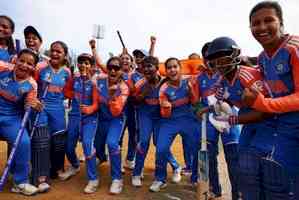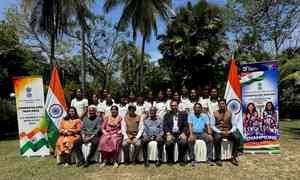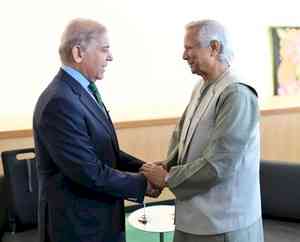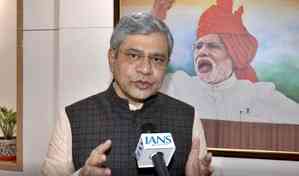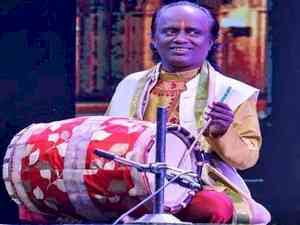Tax authorities to scrutinise amounts made over by BCCI to cricket associations in nature of subsidy: SC
The Supreme Court on Wednesday said an assessee advancing a general public utility cannot engage itself in any trade, commerce, or business, or provide service in relation thereto for any consideration (cess, or fee, or any other) as it observed that in each case, and for every year, the tax authorities are under an obligation to carefully examine and see the pattern of receipts and expenditure in the amounts made over by the BCCI to the cricket associations as infrastructure subsidy.

New Delhi, Oct 19 (IANS) The Supreme Court on Wednesday said an assessee advancing a general public utility cannot engage itself in any trade, commerce, or business, or provide service in relation thereto for any consideration (cess, or fee, or any other) as it observed that in each case, and for every year, the tax authorities are under an obligation to carefully examine and see the pattern of receipts and expenditure in the amounts made over by the BCCI to the cricket associations as infrastructure subsidy.
The top court said the nature of rights conveyed by the BCCI to the successful bidders, the content of broadcast rights as well as the arrangement with respect to state associations have to be examined also.
A bench of Chief Justice U.U. Lalit and Justices S. Ravindra Bhat and P.S. Narasimha said that "in the course of achieving the object of general public utility (GPU), the concerned trust, society, or other such organisation, can carry on trade, commerce or business or provide services in relation thereto for consideration, provided that (i) the activities of trade, commerce or business are connected ('actual carrying out...' inserted w.e.f. April 1, 2016) to the achievement of its objects of GPU."
The top court interpreted the changed definition of "charitable purpose" (w.e.f. April 1, 2009), as well as the later amendments, and other related provisions of the IT Act, which included: general test under Section 2 (15); authorities, corporations, or bodies established by statute, statutory regulators, trade promotion bodies, non-statutory bodies, sports associations, and private trusts.
The bench noted that it was argued that the sport of cricket is a form of education and if it is not considered as a field of education, it is still an object of general public utility. The primary regulating body i.e., the BCCI, promotes sport in the entire country and worldwide, and the assesses (state cricket associations) herein are its second and third tier associations.
Justice Bhat, who authored the judgment on behalf of the bench said: "The court is of the opinion that the ITAT - as well as the High Court fell into error in accepting at face value the submission that the amounts made over by BCCI to the cricket associations were in the nature of infrastructure subsidy. In each case, and for every year, the tax authorities are under an obligation to carefully examine and see the pattern of receipts and expenditure."
"Whilst doing so, the nature of rights conveyed by the BCCI to the successful bidders, in other words, the content of broadcast rights as well as the arrangement with respect to state associations (either in the form of master documents, resolutions or individual agreements with state associations) have to be examined."
The bench said it goes without saying that there need not be an exact correlation or a proportionate division between the receipt and the actual expenditure. "This is in line with the principle that what is an adequate consideration for something which is agreed upon by parties is a matter best left to them. These observations are not, however, to be treated as final; the parties' contentions in this regard are to be considered on their merit," it said.
It added that as far as the state cricket associations are concerned (Saurashtra, Gujarat, Rajasthan, Baroda, and Rajkot), the court is of the opinion that the matter requires further scrutiny.
"Accordingly, a direction is issued that the AO (Assessing Officer) shall adjudicate the matter afresh after issuing notice to the concerned assessees and examining the relevant material... Furthermore, if any consequential order needs to be issued, the same shall be done and resulting actions, including assessment orders shall be passed in accordance with the law under relevant provisions of the IT Act," said the top court, in its 149-page judgment.
The top court judgment came on a batch of appeals and special leave petitions, where the primary question for consideration was the correct interpretation of the proviso to Section 2(15) of the IT Act introduced by amendment w.e.f. April 1, 2009.
The top court said the conclusions arrived at by way of this judgment, neither precludes any of the assessees (whether statutory, or non-statutory) advancing objects of general public utility, from claiming exemption, nor the taxing authorities from denying exemption, in the future, if the receipts of the relevant year exceed the quantitative limit.
"The assessing authorities must on a yearly basis, scrutinise the record to discern whether the nature of the assessee's activities amount to 'trade, commerce, or business' based on its receipts and income (i.e., whether the amounts charged are on cost-basis, or significantly higher). If it is found that they are in the nature of 'trade, commerce or business', then it must be examined whether the quantified limit (as amended from time to time) in proviso to Section 2(15), has been breached, thus disentitling them to exemption," said the bench.
The top court noted that the IT Act visualised three kinds of charitable purposes: medical relief, education, and relief for the poor, and the last - or the residual purpose included by the definition - is "advancement of any other object of general public utility", which was the subject of interpretation in the present case.
The Director General of Income Tax for exemptions, Commissioner of Income Tax in various states, and other officials of the Income tax department appealed the decisions of various high courts, which have held that the carrying on of any trade, commerce, or business, is not a per se bar or disqualification for a GPU category charitable trust to claim to be such, precluding its tax-exempt status under the IT Act.


 IANS
IANS 
